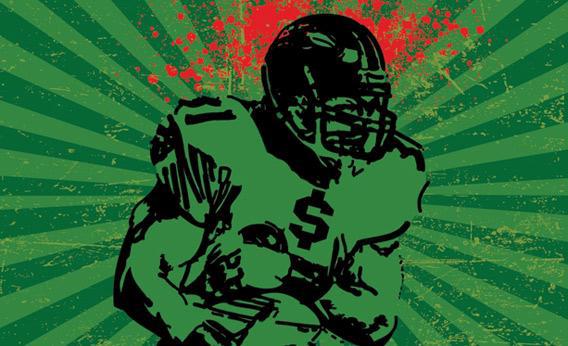In 1905, alarmed by a wave of student-athlete deaths, President Theodore Roosevelt convened a group of professors at the White House to debate the future of college football. One University of Chicago academic pronounced the sport a “boy-killing, man-mutilating, money-making, education-prostituting, gladiatorial” disgrace. Today the game faces the most serious scrutiny in a century. Recent studies have linked football to brain damage, and the college game has been beset by a rash of scandals. Is it too violent and risky for institutions of higher learning? Too exploitative? Does the exaltation of big-time sports on campus undermine the education of athletes or damage the college experience for nonathletes?
Advocates argue that college football connects students with tradition, teaches teamwork and discipline, flushes schools with needed revenue, and provides opportunity via scholarships. Plus, the notion of abolishing such a beloved sport seems unrealistic, a pipedream. Four experts will scrimmage over these issues at the next Slate/Intelligence Squared live debate on May 8 in New York City. We’d like to invite you to attend—we’re offering Slate readers a 30 percent discount on tickets (see below)—and we hope you will use the comments section of this article to submit questions for the debaters. We’ll pick the most interesting one and moderator John Donvan will ask it at the event. Be sure to include your full name and hometown with your question.
The motion for the debate is “ban college football.” Playing offense will be the team of Pulitzer Prize-winning journalist and Friday Night Lights writer Buzz Bissinger and the New Yorker’s Malcolm Gladwell, author of The Tipping Point and Blink. Bissinger will flag the corruption he sees decaying college football from the inside, while Gladwell will tackle the sport’s medical risks. Meanwhile, Tim Green, a former NFL defensive end and broadcaster, will join Fox sports national columnist Jason Whitlock on defense. They’ll contend that the game needs nothing more than thoughtful reforms.
The details about the debate:
When/Where: May 8, 2012, at Skirball Center for the Performing Arts, New York University, located at 566 LaGuardia Place (at Washington Square South). The evening begins at 5:45 p.m. with a cash-bar reception for panelists and audience members; the live debate starts at 6:45 p.m. and ends at 8:30 p.m. For venue information, click here.
Tickets: $40 ($12 for students with ID). Purchase tickets here, and be sure to enter the special Slate promotional discount code, Slate30, to receive 30 percent off your ticket.
About the debaters:
For the motion:
H.G. “Buzz” Bissinger is among the nation’s most honored and distinguished writers. A native of New York City, Bissinger is the winner of the Pulitzer Prize, the Livingston Award, the American Bar Association Silver Gavel Award, and the National Headliners Award, among others. He also was a Nieman Fellow at Harvard University. He is the author of four highly acclaimed nonfiction books: Friday Night Lights, A Prayer for the City, Three Nights in August, and Shooting Stars written with LeBron James. His fifth book and first memoir, Father’s Day: A Journey Into the Mind and Heart of My Extraordinary Son, will be published on May 15 by Houghton Mifflin Harcourt. Currently a sports columnist for the Daily Beast and a contributing editor at Vanity Fair, Buzz has reported for some of the nation’s most prestigious newspapers and magazines, including the New York Times Magazine and Sports Illustrated.
Malcolm Gladwell joined the New Yorker as a staff writer in 1996. He has written on a wide range of topics, including the science of cool hunting, race, and sports, physical genius, the concept of moral hazard and health care, and the difference between puzzles and mysteries. Gladwell came to the New Yorker from the Washington Post, where he started as a staff writer in 1987, first reporting for the business section and then on the sciences, later becoming the newspaper’s New York City bureau chief. Gladwell’s The Tipping Point: How Little Things Make a Big Difference, Blink: The Power of Thinking Without Thinking, and Outliers: The Story of Success, were all No. 1 New York Times best-sellers. In his 2009 New Yorker article “Offensive Play,” he asked: how different are dog fighting and football?
Against the motion:
Former Atlanta Falcons star defensive end Tim Green has been hailed as the “Renaissance Man” of sports. Recently inducted into the College Football Hall of Fame, Green is a New York Times best-selling author, coach, and lawyer, specializing in energy law. He played eight seasons with the Atlanta Falcons and has served as an NFL analyst for Fox Sports and a commentator for NPR and Good Morning America. Green has written 26 books, including a series of sports-based novels for young readers. While at Syracuse University, he was an NCAA Top Six Scholar, a finalist for the Rhodes scholarship, and a two-time All-American and National Football Foundation Scholar-Athlete award winner.
Jason Whitlock is a national columnist for FoxSports.com and an all-sports insider and contributor to Fox Sports Radio. Whitlock was an All-State offensive lineman in high school in Indianapolis and played college football at Ball State University, lettering as an offensive tackle in both 1987 and 1988. He graduated from Ball State in 1990 with a journalism degree. Whitlock’s journalism career has had several stops, including the Bloomington Herald Times, the Charlotte Observer, Vibe Magazine, Playboy Magazine, and the Kansas City Star. In 2008, Whitlock was awarded the National Journalism Award from the Scripps Howard Foundation, the first sports writer to win the award.
The moderator:
John Donvan is an author and correspondent for ABC News. He has served as ABC’s White House correspondent, along with postings in Moscow, London, Jerusalem, and Amman, Jordan. He is writing a book on the history of autism, to be published by Crown in 2013.
